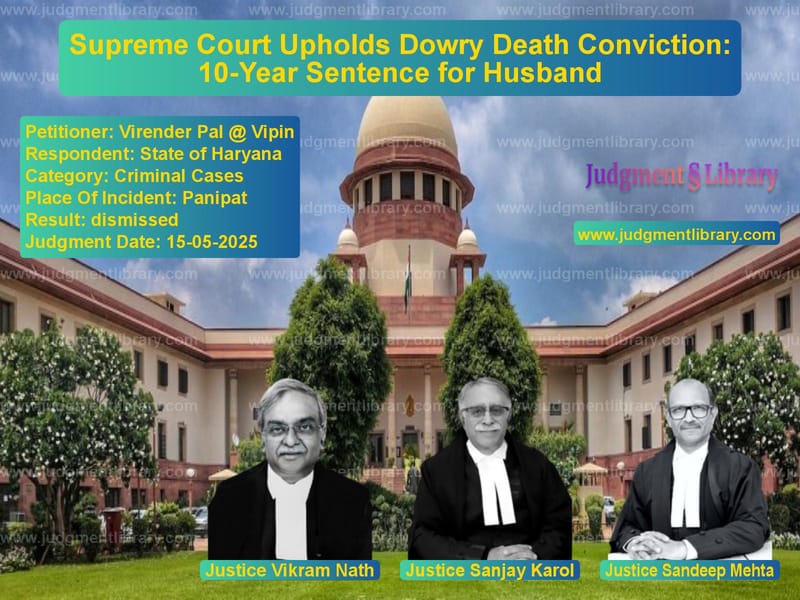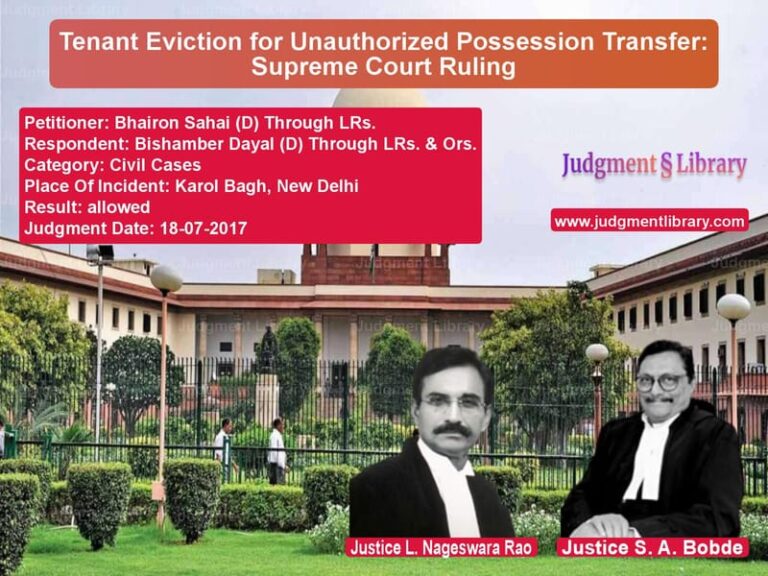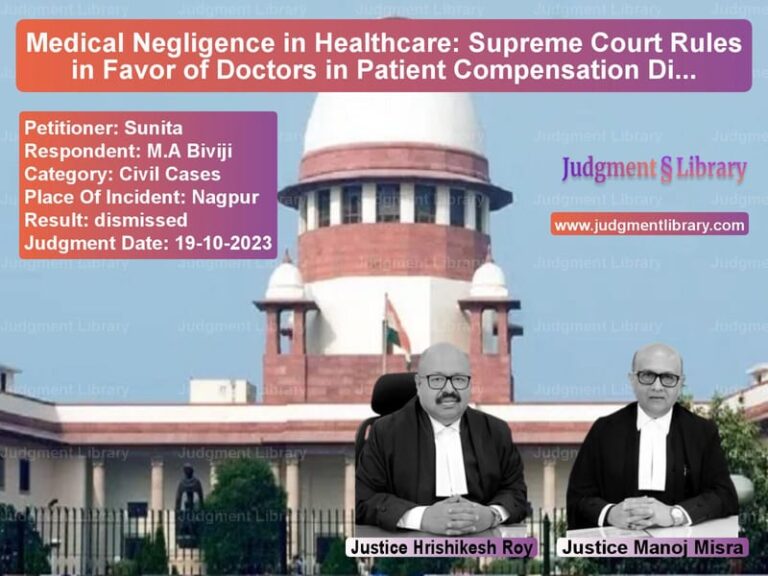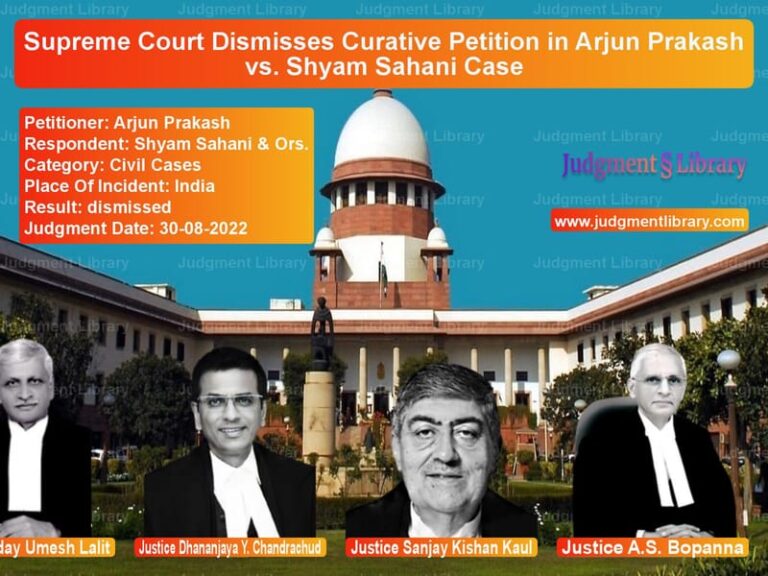Supreme Court Upholds Dowry Death Conviction: 10-Year Sentence for Husband
In a significant judgment that reinforces the legal framework against dowry harassment and dowry deaths, the Supreme Court of India recently dismissed the appeal of a husband convicted for causing his wife’s death through persistent dowry demands and harassment. The case of Virender Pal @ Vipin versus State of Haryana, decided on May 15, 2025, by a bench comprising Justice Vikram Nath, Justice Sanjay Karol, and Justice Sandeep Mehta, examines in detail the legal requirements for proving dowry death under Section 304-B of the Indian Penal Code and the presumption under Section 113-B of the Indian Evidence Act. This judgment underscores the judiciary’s firm stance against the social evil of dowry and its commitment to protecting married women from harassment and violence in their matrimonial homes.
The Tragic Case of Punita’s Death
The case revolves around the tragic death of Punita (also known as Gayatri), who was married to the appellant Virender Pal on February 28, 2008. According to the prosecution’s case, the marital relationship quickly turned sour due to persistent demands for additional dowry. The complainant, Balraj Singh (PW-1), who was Punita’s father, lodged a complaint on June 1, 2009, at Police Station Chandni Bagh, Panipat, alleging that despite giving substantial dowry according to his capacity at the time of marriage, the accused-appellant and his family members remained dissatisfied and subjected Punita to continuous harassment, taunts, and physical abuse.
The situation escalated when the appellant, along with his father and uncle Sukhbir, demanded Rs. 5 lakhs to secure a job for the appellant. The complainant, feeling compelled to protect his daughter, assured them he would arrange the money but needed time. When Sukhbir and the appellant came to take Punita back to her matrimonial home, the complainant gave them Rs. 50,000. However, the harassment resumed after a few months, with continued demands for the remaining amount.
The case took a tragic turn on June 1, 2009, when at approximately 7:45 AM, Punita telephonically informed her brother Satender Kumar (PW-3) that on the previous night, her husband, father-in-law, mother-in-law, brother-in-law, and uncle-in-law had assaulted her. She expressed fear for her life and requested him to come immediately. Merely 15 minutes later, at about 8:00 AM, the complainant received a call from the appellant informing him that his daughter had died. When the maternal family members reached Panipat, they learned that Punita had allegedly jumped from the roof of the house.
Legal Proceedings Through the Courts
Based on the complaint, FIR No. 335 of 2009 was registered against the appellant and his family members for offenses punishable under Section 304-B read with Section 34 of the IPC. After investigation, a chargesheet was filed against the appellant, his father, and mother. The case was committed to the Sessions Court, which framed charges against the accused persons.
The prosecution examined 12 witnesses, including the complainant father (PW-1), brothers of the deceased (PW-2 and PW-3), medical officer (PW-9), and other official witnesses. The defense examined 8 witnesses, primarily to establish that Punita was suffering from knee problems and was under depression, which led her to commit suicide.
The Trial Court, after appreciating the evidence, acquitted the appellant’s parents but convicted the appellant under Section 304-B of the IPC, sentencing him to 10 years of rigorous imprisonment. The High Court dismissed the appellant’s appeal, leading to the present appeal before the Supreme Court.
Arguments Presented by the Appellant
The appellant’s counsel made several key arguments challenging the conviction. “Learned counsel, appearing on behalf of the accused-appellant, vehemently and fervently argued that deceased-Punita suffered from a knee problem because of which she was under depression, leading her to commit suicide.” The defense maintained that Punita’s medical condition, not dowry harassment, was the cause of her suicide.
The appellant contested the characterization of the monetary demands as dowry, arguing that “there was no demand of dowry by the accused-appellant as the demand of cash for securing job for the accused-appellant cannot be treated equivalent to a demand of dowry.” This argument sought to distinguish between dowry demands and other financial demands.
Regarding the consistency of evidence, the appellant contended that “the statements of Shri Balraj Singh (PW-1), Pramod Kumar (PW-2), Satendra Kumar (PW-3) and Jitendra Pal (PW-10) are not consistent but contradictory in nature with respect to the alleged cruelty meted out by the accused-appellant and his family members to deceased-Punita with respect to dowry demand.”
The appellant emphasized the legal requirements for invoking Section 304-B, stating that “for a presumption to be raised under Section 113-B of the Evidence Act, the following conditions have to be fulfilled: i. That the woman met with unnatural death within a period of seven years of her marriage; ii. The woman was subjected to cruelty or harassment by her husband or his relatives; iii. Such cruelty or harassment was for, or in connection with, any demand for dowry; and iv. Such cruelty or harassment was soon before her death.”
The appellant argued that “the prosecution was under obligation to prove that soon before the occurrence, cruelty or harassment was meted out to deceased-Punita, which compelled her to take the extreme step of ending her own life, however, the prosecution miserably failed to discharge this onus cast upon it by law.”
Arguments Presented by the State
The State vehemently opposed the appellant’s arguments, contending that “the High Court has rightly held that there is ample evidence of unimpeachable nature against the accused-appellant establishing his guilt for the charges levelled.” The prosecution emphasized the recovery of dowry articles from the matrimonial home and the consistent testimony of material witnesses.
The State argued that “the evidence of the material prosecution witnesses is consistent with regard to demand of dowry and harassment meted out by the accused-appellant to deceased-Punita soon before her death.” They maintained that the prosecution had successfully established all essential ingredients of dowry death.
Regarding the legal presumption, the State submitted that “since the prosecution has proved the essential ingredients of dowry death, the Court has to infer the guilt of the accused-appellant, unless he is able to discharge the burden cast upon him by virtue of Section 113-B of the Evidence Act.” They emphasized that “the prosecution has led reliable evidence showing that the deceased-Punita, met with an unnatural death within seven years of marriage, and that she was continuously harassed and mal-treated for dowry demands by her husband or his family members soon before her death.”
The Supreme Court’s Detailed Analysis
The Supreme Court conducted a thorough examination of the evidence and legal principles. The Court first addressed the medical evidence regarding Punita’s death. Dr. Rahul Diwan (PW-9), the Medical Officer who conducted the post-mortem, had noted multiple injuries including “massive subdural haematoma involving both parieto temporal region of brain with underlying brain parenchyma haemorrhagic” and other contusions and abrasions. The cause of death was opined as “shock and haemorrhage due to injury on the vital organ, i.e., brain, which was ante-mortem in nature.”
The Court noted some procedural irregularities in the recording of the medical officer’s evidence but concluded that “this omission on the part of the presiding officer tantamounts to a curable irregularity because no prejudice was caused to the accused-appellant by following such course of action.” The Court firmly held that “upon going through the post-mortem report, it is clear that the death of Punita was caused by ante-mortem injuries caused by mechanical violence and hence, her death was definitely otherwise than under natural circumstances within the meaning of Section 304-B IPC.”
The Court critically examined the appellant’s alternative defenses, noting that “the accused has taken alternative defences for explaining the death of Punita. The two defences which are totally divergent are (a) that the deceased accidently fell down from the terrace and received the injuries, or (b) that the deceased-Punita committed suicide by jumping from the terrace as she was perturbed because of the knee issue which was plaguing her.” The Court found these defenses untenable, stating that “this diametrically opposite defence taken by the accused-appellant does not have any legs to stand.”
The Court placed significant reliance on the testimony of Satender Kumar (PW-3), who “categorically stated that when he reached the matrimonial home of his sister after receiving the news of her death, he saw the dead body of his sister lying on a cot at the second floor of the building and blood was oozing from her nose and ear.” The Court emphasized that “no cross-examination whatsoever was conducted from Satender Kumar (PW-3) on this important aspect of his testimony.” This undermined the appellant’s theory about Punita falling or jumping from the terrace.
Assessment of Dowry Harassment Evidence
The Court meticulously analyzed the evidence regarding dowry demands and harassment. The Court noted that “there are consistent evidence from the testimonies of the material prosecution witnesses, i.e., Balraj Singh (PW-1) father of the deceased, Parmod Kumar (PW-2) brother of the deceased, and Satender Kumar (PW-3) another brother of the deceased, that deceased-Punita was continuously being harassed by the accused-appellant and his relatives on account of the demand of dowry.”
The Court found particularly compelling the evidence about the panchayat meeting where monetary demands were made. The Court observed that “the fact regarding holding of a Panchayat is corroborated by the defence witnesses as well. Of course, the version of the defence witnesses is that the Panchayat was held to discuss the medical issues being faced by the deceased-Punita.” However, the Court rejected this explanation, reasoning that “deceased-Punita being a young woman of less than 30 years could not have been so perturbed by the knee issue that the resolution would require a Panchayat meeting.”
The Court also addressed the defense theory about Punita’s knee problems leading to depression and suicide. After examining the testimony of defense doctors, the Court concluded that “whatever the gravity of the knee issues may have been, that by itself could not have instigated deceased-Punita to end her life because admittedly she was being provided treatment, and her pain had subsidised as per the evidence of the defence witness, Dr. Sandeep Grover (DW-7).” The Court found that “the plea taken by the defence that deceased-Punita was so perturbed by her knee issues that she ended her life by jumping from the terrace is absolutely flimsy and unbelievable.”
The Court gave significant weight to Punita’s final telephone call to her brother, noting that “Satender Kumar (PW-3), made a categorical statement that on the date of the incident, deceased-Punita called him over telephone, and she was in despair and was crying. She conveyed that the accused-appellant had beaten her earlier night and she is apprehending that she might be killed. She made a fervent plea to be saved from the clutches of the accused persons.” The Court emphasized that “this version of Satender Kumar (PW-3) could not be shaken in cross-examination.”
Legal Principles and Final Conclusion
The Supreme Court reaffirmed the legal framework governing dowry death cases. The Court emphasized that once the prosecution establishes that a woman died an unnatural death within seven years of marriage and there is evidence of cruelty or harassment for dowry soon before her death, the presumption under Section 113-B of the Evidence Act operates against the accused.
The Court found that all essential ingredients of Section 304-B were satisfied in this case: Punita died an unnatural death within seven years of marriage (just one year and four months); there was consistent evidence of harassment and cruelty; the harassment was in connection with dowry demands; and the harassment continued soon before her death, as evidenced by her final distress call.
The Court concluded that “the accused-appellant, being the husband of deceased-Punita, was under a greater obligation, both moral as well as legal, to ensure the well-being of his wife, but he failed to do so. He was primarily responsible for the demands of money being made from the deceased and her maternal family members.”
Ultimately, the Court held that “all the ingredients required to prove the offence punishable under Section 304-B of the IPC against the accused-appellant are made out from the evidence available on record.” The Court dismissed the appeal and directed the appellant to surrender within four weeks to serve the remaining sentence.
Broader Implications
This judgment reinforces the judiciary’s commitment to combating the social evil of dowry and protecting women’s rights in matrimonial relationships. By upholding the conviction and 10-year sentence, the Supreme Court has sent a strong message that dowry harassment and resulting deaths will be dealt with strictly under the law.
The judgment also clarifies that demands for money under the guise of employment or other purposes, when made around the time of marriage and accompanied by harassment, can constitute dowry demands under the law. The Court’s rejection of contradictory defense theories and its reliance on consistent prosecution evidence establishes important precedents for future dowry death cases.
For society at large, this judgment serves as a reminder of the legal consequences of dowry harassment and the judiciary’s role in protecting vulnerable women in matrimonial homes. For the legal community, it reinforces the importance of thorough evidence collection and presentation in cases involving domestic violence and dowry deaths.
Petitioner Name: Virender Pal @ Vipin.Respondent Name: State of Haryana.Judgment By: Justice Vikram Nath, Justice Sanjay Karol, Justice Sandeep Mehta.Place Of Incident: Panipat.Judgment Date: 15-05-2025.Result: dismissed.
Don’t miss out on the full details! Download the complete judgment in PDF format below and gain valuable insights instantly!
Download Judgment: virender-pal-@-vipin-vs-state-of-haryana-supreme-court-of-india-judgment-dated-15-05-2025.pdf
Directly Download Judgment: Directly download this Judgment
See all petitions in Dowry Cases
See all petitions in Domestic Violence
See all petitions in Judgment by Vikram Nath
See all petitions in Judgment by Sanjay Karol
See all petitions in Judgment by Sandeep Mehta
See all petitions in dismissed
See all petitions in supreme court of India judgments May 2025
See all petitions in 2025 judgments
See all posts in Criminal Cases Category
See all allowed petitions in Criminal Cases Category
See all Dismissed petitions in Criminal Cases Category
See all partially allowed petitions in Criminal Cases Category







